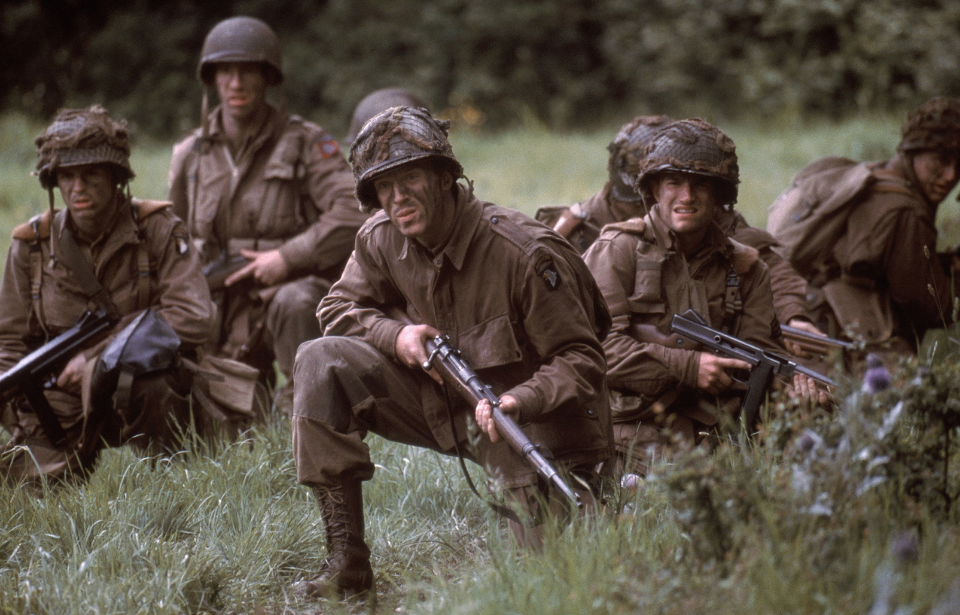The accomplishments of Easy Company, 2nd Battalion, 506th Parachute Infantry Regiment, 101st Airborne Division during the Second World War are perhaps most famously portrayed in Steven Spielberg‘s HBO miniseries, Band of Brothers (2001). They fought throughout Europe, with their most notable engagements being Operations Overlord and Market Garden, as well as the Battle of the Bulge.
The following are a set of photos commemorating the brave men of Easy Company.
A brief history of Easy Company’s service during World War II
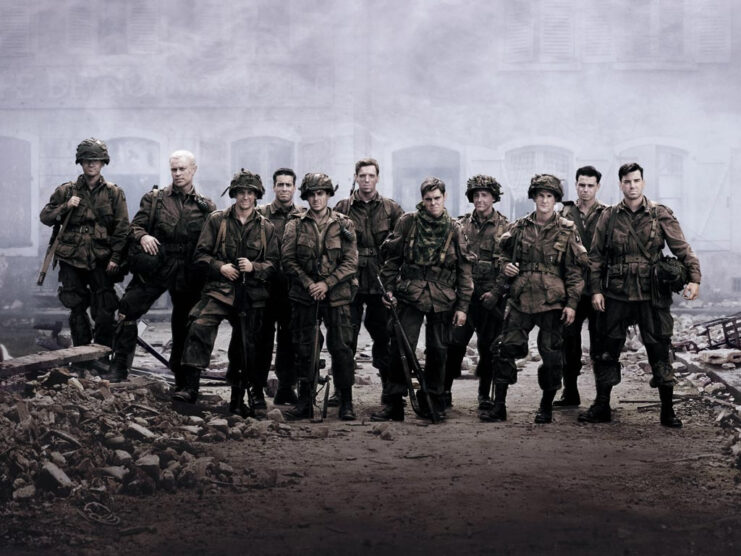
Easy Company was established at Camp Toccoa, Georgia in 1942, as part of the experimental 506th Parachute Infantry Regiment. During this time, its members underwent intense and extensive training. The most physically challenging part of this was running up the 1,735-foot Currahee Mountain, which itself became an unofficial symbol of the regiment. In fact, its members adopted the nickname, “Currahee.” Easy Company also chose it to be their motto, meaning, “We stand alone together.”
While known as Easy Company, what these men faced was anything but. During Operation Overlord, they served as part of the airborne invading force tasked with securing the rear and providing cover until the beachheads at Utah and Omaha were linked. To accomplish this, they had to take and hold the French town of Carentan. While successful in this endeavor, the Americans had to face intense German defenses, such as machine gun teams and tanks.
Following the liberation of France, Easy Company was sent to assist the British forces in and around Eindhoven, as part of Operation Market Garden. In late October 1944, they played a key role in evacuating over 100 British soldiers who’d become trapped behind German lines near the village of Renkum during the Battle of Arnhem. Known as Operation Pegasus, the Americans were able to save their fellow Allied soldiers in just 90 minutes.
Their next stop was the winter offensive in December 1944 and January ’45, in Belgium. Easy Company, along with the rest of the 101st Airborne Division, took part in the famous Battle of the Bulge. They fought under horrible winter conditions, suffering from a general lack of supplies and ammunition.
Some of their more notable actions during this period involved taking control of the Bois Jacques area, as well as the frustrating attack on the town of Foy, where they dealt with fierce resistance and a breakdown in the chain of command. Foy was eventually captured from the enemy, as the German line in Bastogne fell. The figurative gates of Germany were finally open.
As the Second World War neared its end, Easy Company was assigned to occupation duties, included guarding the Führer‘s Eagle’s Nest. The 506th Parachute Infantry Regiment is still in service with the US Army as a training unit.
Guarding the Eagle’s Nest
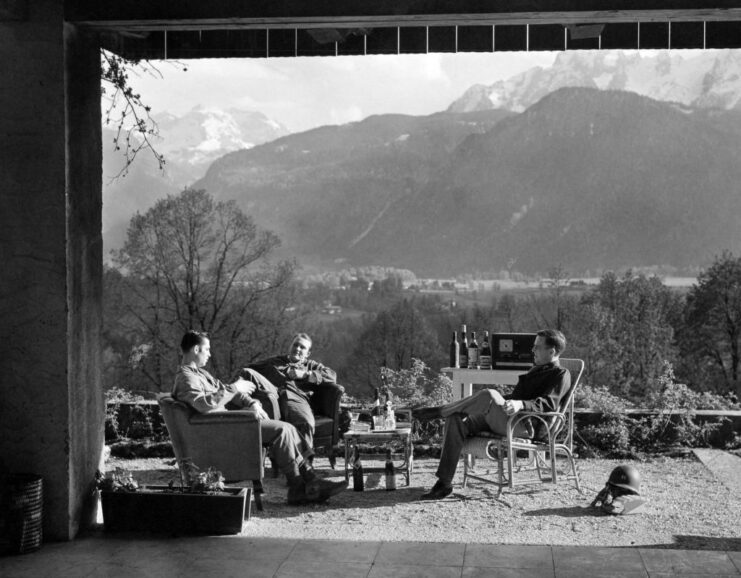
Officially known as Kehlsteinhaus, the Eagle’s Nest was visited exclusively by the Führer and high-ranking German military and political personnel during World War II. It’s located atop the Kehlstein, near the town of Berchtesgaden. The location was taken by the Allies in the latter months of the conflict, and they used it as a military command post until 1960.
As aforementioned, the Eagle’s Nest was among the locations Easy Company was tasked with guarding. In this photo, three members, including Maj. Richard Winters, can be seen taking a much-deserved relaxing break at the site.
Col. Edward Shames
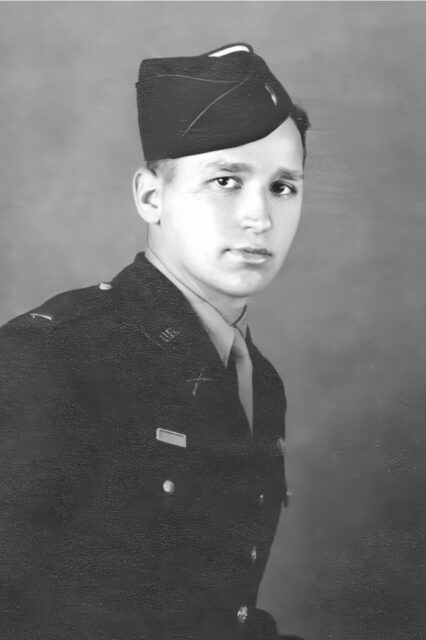
Col. Edward Shames joined the US Army after reading about the 506th Parachute Infantry Regiment. During the Second World War, he served with two companies within the regiment: Easy Company, 2nd Battalion and I Company, 3rd Battalion. It wasn’t until after Operation Overlord that he was transferred to the former.
One of Shames’ most notable successes came in Bastogne, while he and the rest of the 101st Airborne were fighting the Battle of the Bulge. Together with another soldier, he used a Bazooka to take out a German tank. At the Eagle’s Nest, he found a bottle of cognac, which he later used to toast his son’s Bar Mitzvah.
Joseph May portrayed Shames in Band of Brothers.
Inspecting the paratroopers
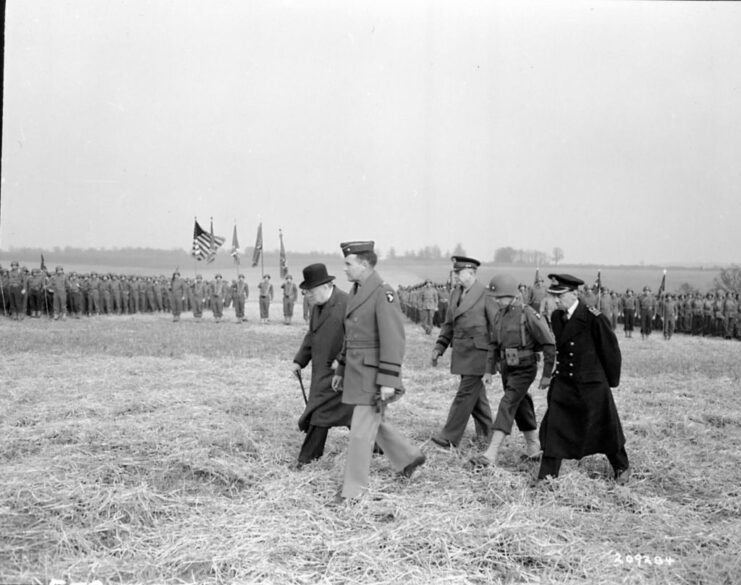
Prior to the D-Day landings on June 6, 1944, British Prime Minister Winston Churchill, Gen. Dwight D. Eisenhower and other officials visited paratroopers with the 101st Airborne Division. Among those present were members of Easy Company, who left England soon after to land in France.
Lt. Col. Lynn “Buck” Compton
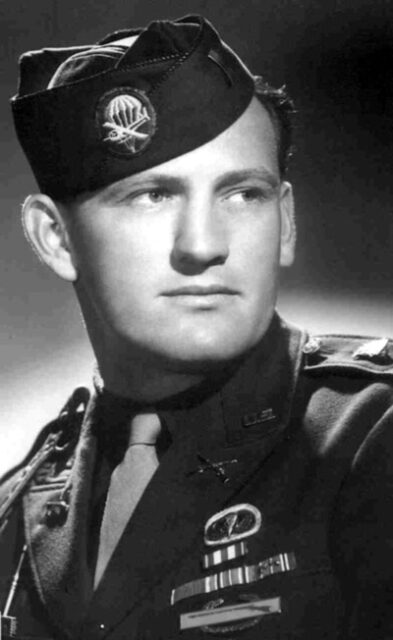
Lt. Col. Lynn “Buck” Compton was a member of the Reserve Officers’ Training Corps (ROTC) between 1940-43, before enlisting in the US Army and serving with Easy Company, 2nd Battalion, 506th Parachute Infantry Regiment, 101st Airborne Division. He was ready for action just prior to Operation Overlord, where he and others disabled German howitzers on Utah Beach.
While fighting alongside his comrades during the Battle of the Bulge, Compton was evacuated and sent to obtain medical help after developing trench foot. Following the war, he joined the US Air Force Reserve, and didn’t retire from the military until he was nearly 50.
Neal McDonough portrays Compton in Band of Brothers.
Surviving World War II
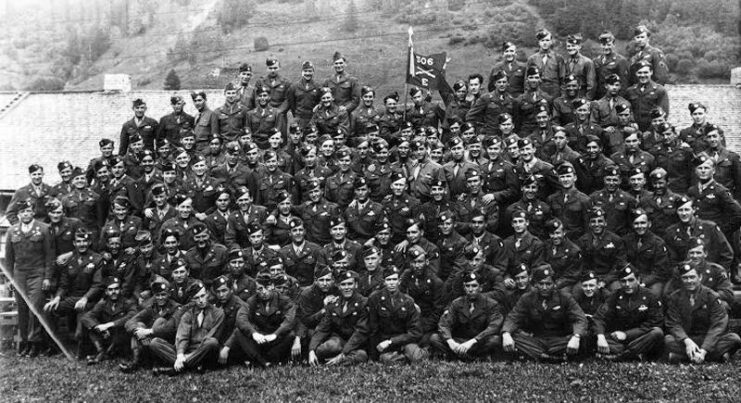
We can only imagine the elation these members of Easy Company felt upon surviving the fighting that came to define the Second World War. This photo was taken in Austria in mid-1945, and features many notable names, including Edward “Babe” Heffron.
Staff Sgt. Darrell “Shifty” Powers
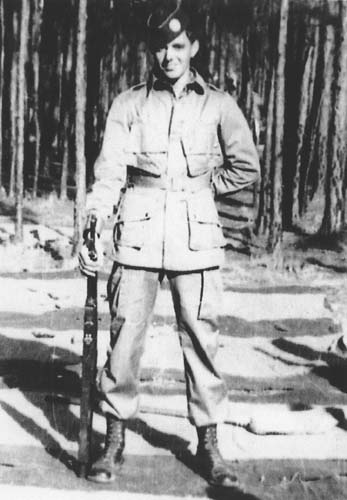
Staff Sgt. Darrell “Shifty” Powers was among the luckiest members of Easy Company, having never been injured in combat. He jumped over Normandy on D-Day, and later went on to fight in the Netherlands and Belgium.
It was during the Battle of the Bulge that Powers earned his fame. Not only did he take out an enemy sniper, he was responsible for uncovering a camouflaged German anti-aircraft battery, leading to its destruction by members of the 101st Airborne Division. He was discharged as part of the postwar demobilization.
Peter Youngblood Hills portrayed Powers in Band of Brothers.
Sainte-Marie-du-Mont
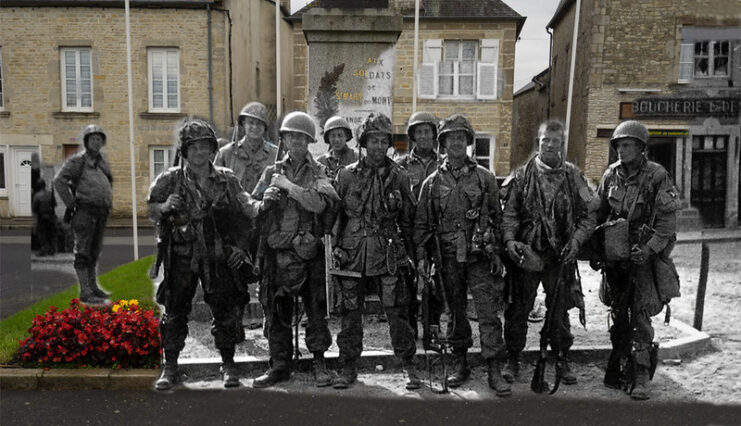
This incredible then-and-now photo shows members of Easy Company and the 4th Infantry Division in the French commune of Sainte-Marie-du-Mont. The area was the site of an intense battle between the Allies and Germans on June 6, 1944. A plaque has since been erected to commemorate the actions of the 101st Airborne Division that day.
Maj. Richard Winters
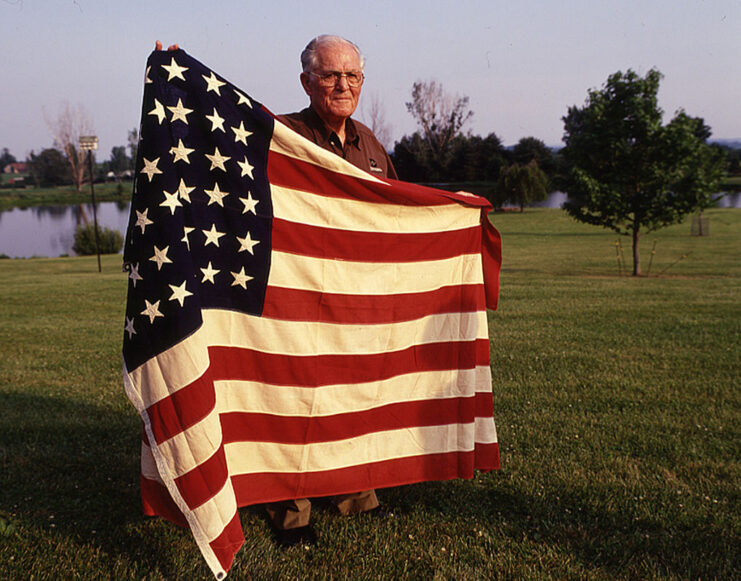
Maj. Richard Winters was the commander of Easy Company during the Second World War. After joining the US Army in 1941 and undergoing Basic Training at Camp Croft, South Carolina, he was selected for Officer Candidate School at Fort Benning, Georgia (now Fort Moore). Following his commission as a second lieutenant, Winters decided to join the parachute infantry of the newly-created airborne forces.
Assigned to Easy Company, Winters participated in several big-name engagements throughout the war. His most memorable was Operation Overlord, when he became the company’s de facto commanding officer, following the disappearance of 1st Lt. Thomas Meehan.
Damian Lewis portrayed Winters in Band of Brothers.
Taking Foy during the Battle of the Bulge
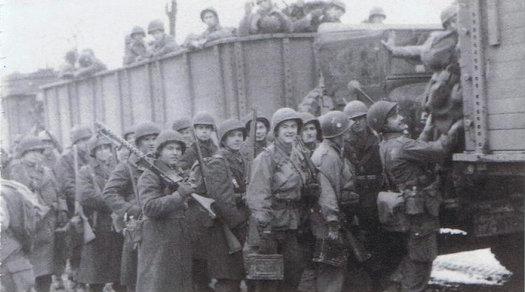
The Belgian town of Foy fell under the control of the Wehrmacht following the German invasion in May 1940. Prior to the 101st Airborne Division arriving on the scene, the 1st Canadian Parachute Division was tasked with patroling the area, as part of the Battle of the Bulge.
After being relieved by George Patton‘s US Third Army, the 101st took the town from the German enemy, overshadowing the role the Canadians played, however small it might have been.
At the premiere for Band of Brothers (2001)
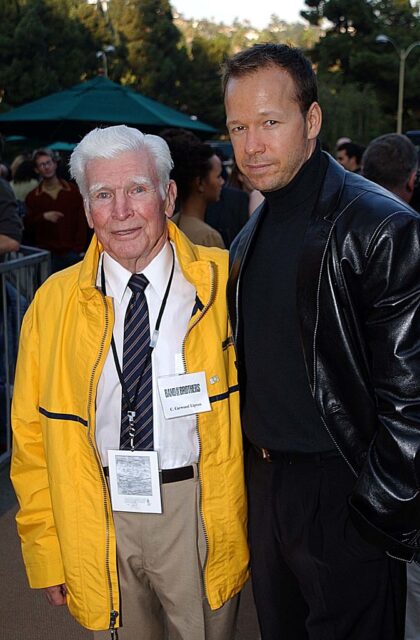
Several big names portrayed the veterans of Easy Company in Band of Brothers. Among them was Donnie Wahlberg, who used his acting chops to bring the bravery of 1st Lt. Carwood Lipton to the HBO miniseries. The above photo shows the pair at the Hollywood premiere in August 2001.
During Operation Overlord, Lipton served as one of the jumpmasters aboard one of the Douglas C-47 Skytrains that dropped paratroopers over Normandy. After landing in France, he participated in several battles, going on to earn a Bronze Star after taking out an enemy soldier with an M1 Carbine.
Tech. Sgt. Donald Malarkey
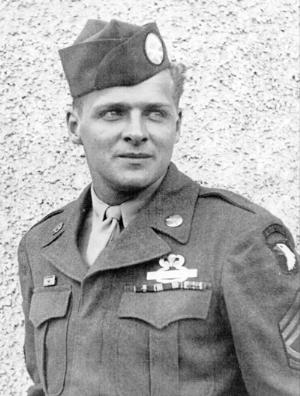
Tech. Sgt. Donald Malarkey was inspired to enlist in the US military following the Japanese attack on Pearl Harbor. He first tried to join the US Marine Corps, but dental issues prevented him from being accepted. He then attempted to enlist with the US Army Air Corps, but was, again, denied, this time for his poor math skills. As they say, third time’s the charm, as he volunteered to be a paratrooper and was accepted.
Malarkey was assigned to Easy Company, with whom he fought across Europe. Despite serving on the front on several occasions, he never once suffered a serious injury, earning him the distinction of having served the most consecutive time on the frontlines than anyone else in Easy Company.
Scott Grimes portrayed him in Band of Brothers.
Taking in the view at the Eagle’s Nest
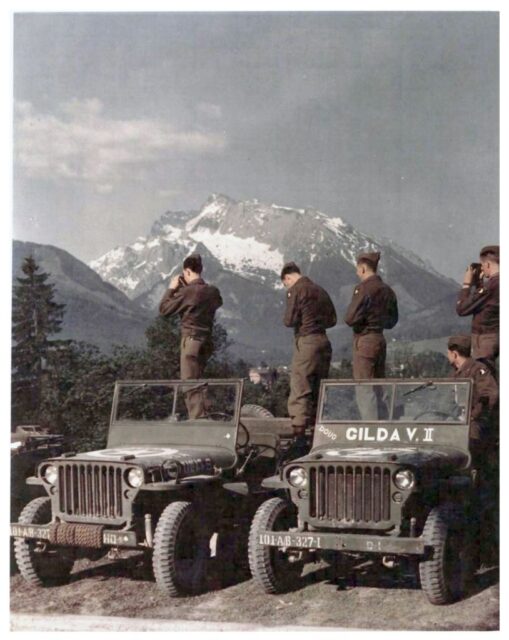
This photo shows 101st Airborne Division infantrymen – possibly members of Easy Company – taking in the view of the Bavarian Alps following the capture of the Führer‘s Eagle’s Nest, in 1945. Today, the location is owned by a charitable trust, which runs a restaurant for tourists to visit and dine at.
Pfc. Ed Tipper
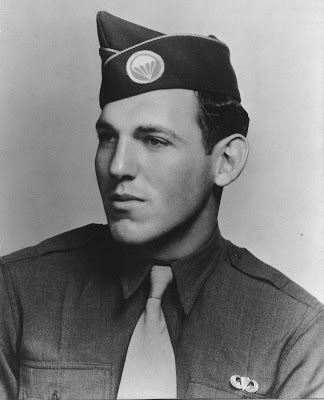
Ed Tipper was one of the original members of Easy Company, 2nd Battalion, 506th Parachute Infantry Regiments, 101st Airborne Division. Interestingly, he’d initially wanted to become a Marine, but was rejected because his teeth couldn’t bite together. With the desire to serve his country in another way, he subsequently volunteered to become a paratrooper.
While fighting at Carentan, Tipper was seriously injured. After clearing a residence of enemy combatants, a mortar shell went off, breaking his legs and rending his right eye completely useless. He was sent to a hospital in England, after which he was sent back to the United States. The next year saw him receive treatment at various Army hospitals, after which he was discharged.
Bart Ruspoli portrayed Tipper in Band of Brothers.
Pfc. Albert Blithe
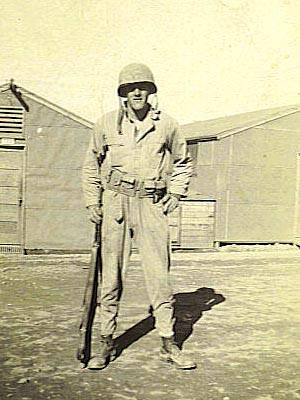
Pfc. Albert Blithe trained at Camp Toccoa, Georgia, under Capt. Herbert Sobel. After landing in Normandy, he fought at Carentan, where he developed a case of “hysterical blindness,” which rectified itself after a few days. That wasn’t the end of his injuries, as it was shortly after that a German sniper shot him in the collarbone.
The wound he suffered as a result led to him being sent back to the United States. He never returned to the European Theater, as he wasn’t discharged from an Army hospital until October 1945, well after WWII had come to an end. He later went on to serve in Korea with the 187th Airborne Regimental Combat Team, 101st Airborne Division.
Marc Warren portrated Blithe in Band of Brothers.
Easy Company reunion
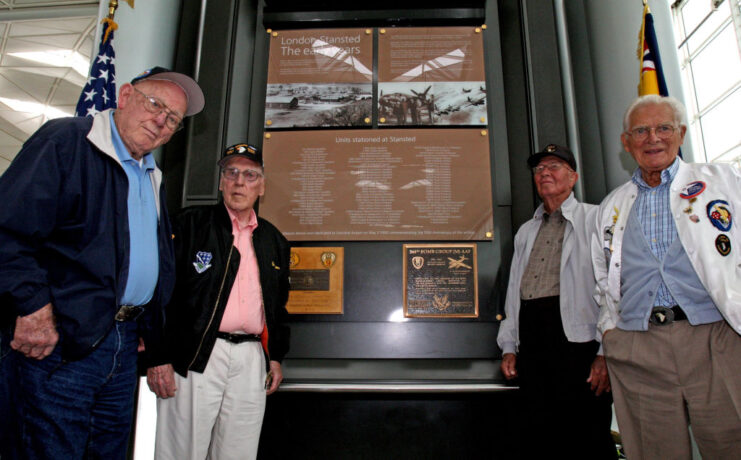
In 2009, there was a mini Easy Company reunion in Essex. Lynn “Buck” Compton, Donald Malarkey, Bradford Freeman and Ed Tipper came together for the unveiling of a plaque at Stansted Airport, which serves as a memorial for all those who served out of the location during WWII.
Postcards from home
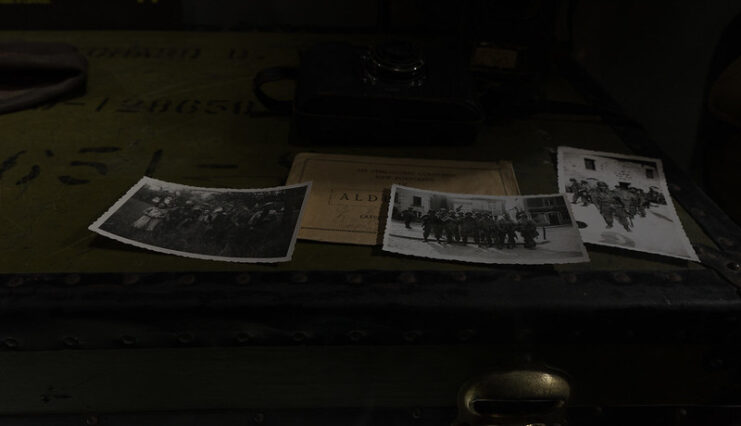
The above photo features a postcard addressed to Sgt. Forrest Leroy Guth, one of the original 140 members of Easy Company, 2nd Battalion, 506th Parachute Infantry Regiment, 101st Airborne Division. Guth was employed at Bethlehem Steel when the Japanese attacked Pearl Harbor on December 7, 1941. Despite contributing to the war effort via the manufacturing of armor plates for the US Navy, he felt he needed to do more and volunteered for the Army.
More from us: ‘Band of Brothers’ Actors Who Later Became Big-Time Stars
The three accompanying photos were taken while Easy Company was in Saint-Côme-du-Mont. The French commune was liberated by the Allies on June 8, 1944, just a few days after the Normandy landings.
